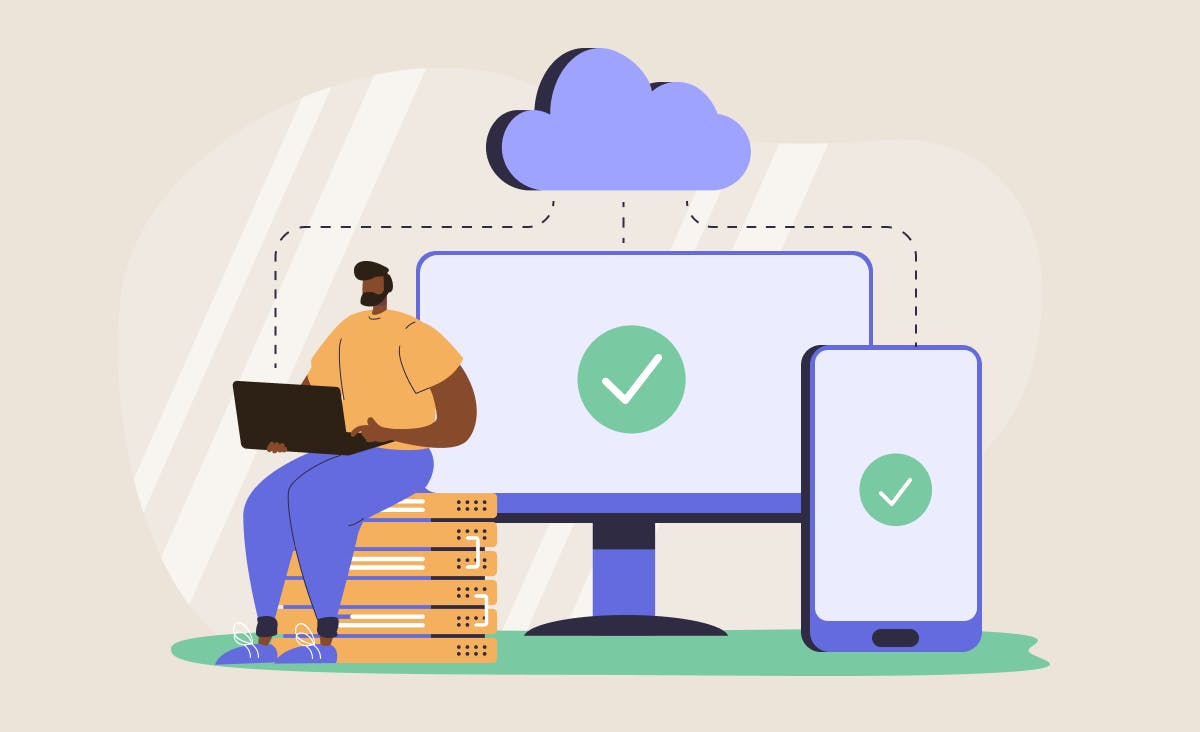Why is cloud app development crucial for digital businesses?
Cloud technologies have changed the way digital businesses operate, offering benefits that traditional methods of data storage and management simply cannot match. In this article, we’ll explore what a cloud app is, the benefits of cloud services for custom app development, why your business needs it, and how to choose a reliable cloud provider.
What is a cloud-based application?
The ‘cloud’ is more like a metaphor referring to a set of technologies that help businesses create applications with fewer expenses. Basically, a cloud-based app is an application that stores data on external servers and executes some processes with the help of cloud computing.
How exactly do cloud technologies work:
First of all, the cloud is not a completely ‘virtual’ storage. Cloud application data is hosted on physical servers and can be accessed from a device with Internet access. Usually, these servers are provided by cloud vendors that have enough resources to deliver computing services.
It doesn’t mean the entire application is stored in the cloud and the user doesn’t need to install it on their device. As a rule, to be able to use the app’s functionality, users must install it on their device. However, the user’s data — their account, purchase history, viewed pages, etc. — are stored in the cloud. It means that if the user decides to install the app on a new device, they’ll be able to enter their account and access all the data.
Let’s take the Genshin Impact game as an example. Users need to install the game on PCs or mobile devices to play it, so it’s not like the game exists in the cloud. Although, some of its features are based on cloud computing. The game saves the user’s progress in the cloud, so they don’t need to save the game manually and can enter their account from any device and continue playing from the moment they left off.
As you can see, you can use cloud technologies to run particular processes in the app, and to store big amounts of data.
Which apps need cloud computing?
Almost any app that has big amounts of data needs cloud tools. From startups to giant corporations — most digital businesses use cloud computing in one way or another. According to statistics, the global cloud app development market is projected to grow up to $168.6 billion by 2025.
Amazon Web Services dominates the market of cloud services, with 34% of the market share. Microsoft Azure and Google Cloud are among the leading companies as well, they take 21% and 11% of the market share.
Why use a cloud for app development
Do you need to use the services of cloud providers or should you set up your own servers to store data? Let’s figure out which benefits cloud application development gives entrepreneurs.
Lower costs
Creating and maintaining an on-premise infrastructure is very expensive. Apart from buying physical servers and other equipment, you would need to set up a space to place all this hardware and hire people to take care of it. Moreover, once your business starts growing, you would need to buy additional servers to scale up. That’s why in most cases it’s much more efficient to let cloud providers do this for you. It’s similar to paying for electricity. Installing your own power generator is very expensive and requires extensive maintenance. Instead, people just pay for power suppliers that provide electricity to their houses.
High scalability
When you rent a space from a cloud provider, you can scale up or down at any time without significant extra costs. Scaling with on-premises infrastructure can take weeks and require vast expenses. Cloud providers already have all the needed infrastructure, so scaling can be done quickly and easily with their help.
Data protection
The cloud allows you to create data backups on multiple servers in different locations to avoid losing important data. Storing all data in one place is quite risky since servers can shut down due to power outages and other circumstances. Cloud app development lets you minimize this risk and be able to restore data if needed.
Minimized downtime
Downtime events can result in poor user experience and damage the company’s reputation. If one server or data center of a cloud provider shuts down, the workload will be automatically shifted to another one, which minimizes downtime and helps to avoid terrible consequences for the business.
Are clouds secure enough?
Security and data privacy are two of the biggest concerns for businesses when it comes to storing data. Hence, entrepreneurs often question whether cloud infrastructures are well protected from cyber-attacks and crashes.
First of all, cloud providers place their servers in well-secured areas equipped with the most modern means of protection. They have special air conditioning and fire extinguishing systems, as well as additional power generators. The reliability of all equipment and its fault tolerance is certified by organizations like Uptime Institute, MTCS, NIST, and others. Top cloud providers have Tier 3 certificates — which means that they have a 99.982% fault tolerance.
Moreover, cloud providers typically offer robust security measures, such as encryption, firewalls, and intrusion detection systems, to ensure that data remains safe and secure. Information security specialists regularly check these systems for vulnerabilities. Only the largest companies in the world can afford an infrastructure like this. Smaller companies don’t have such high-level specialists, and such effective and expensive IT complexes to protect customer data. Of course, like any data storage, clouds are not 100% secure, but they’re as secure as possible.
However, you shouldn’t neglect additional security measures. A good security practice for cloud app development is to implement strong authentication and access controls. Finally, it’s important to monitor cloud-based applications to detect and respond to security threats. This involves using tools and technologies to track unusual activity, as well as conducting regular security audits.
How to choose a cloud provider?
When choosing a cloud provider, you need to consider several factors that may vary depending on the specific needs and limitations of the cloud app development project:
- type and volume of data that you need to store and use
- reliability and security
- availability and performance
- cost
- scalability
- ease of use
- geographical location
Here’s the list of top cloud providers:
AWSAmazon Web Services provides multiple cloud services, including storage, databases, virtual servers, machine learning instruments, and other cloud resources. Some of the most popular ones are Amazon S3, Amazon EC2, and Amazon RDS. The company provides the highest security measures like data encryption, identity and access control, penetration testing, DDoS mitigation, and others. AWS has 40+ compliance certifications, including global and country-specific quality and security standards. As for geographical location, AWS offers 99 availability zones in 31 regions around the world.
Microsoft Azure provides hundreds of cloud services, including storage and databases, virtual machines, machine learning, DevOps, blockchain, and more. Azure is a leader in AI and machine learning cloud services, while Microsoft Cognitive Services is one of its most advanced offerings. The company offers multiple security options like DDoS protection, VPN gateways, advanced threat protection, key control, and others. Azure has 90 compliance certifications for global, country-specific, and industry-specific standards. Microsoft Azure is available in 140 countries and 54 regions around the world.
Google CloudGoogle Cloud offers various services like storage, computing, virtualization, databases, DevOps, machine learning, and more. The platform has around 160 compliance certifications, including security, privacy, quality, and risk management regulations. As for security measures, Google Cloud provides data encryption, phishing-resistant security keys, strong authentication, DDoS protection, and others. The provider has 109 availability zones in 36 regions around the world.
Alibaba CloudAlibaba Cloud is the largest cloud provider in China, offering cloud services like databases, storage, computing, DevOps, analytics, and others. The company has 86 available zones in 28 regions. Alibaba Cloud offers such security measures as fraud detection, data encryption, firewalls, key management, DDoS protection, and penetration tests.
Choose a cloud provider that offers robust security measures, such as encryption, firewalls, and intrusion detection systems. Don’t forget to check their compliance with security standards. Cost is another critical factor to consider when adopting cloud computing. You need to make a choice based on your business needs and budget expectations — look for the features the provider offers, the locations of the servers and databases, and their prices.
How we use cloud technologies at Ronas IT
Cloud providers provide data storage and processing services that can be used to store any type of information. There are several types of cloud storage:
- Object storage — data storage for massive and growing amounts of unstructured data, such as photos, videos, sensor data, audio files, and other types of content. Objects are kept in secure buckets rather than folders or files.
- File storage — file-based data storage is widely used in app development and stores data in a hierarchical folder and file format.
- Block storage — this type of data storage stores data in the form of blocks that have their individual identifiers for quick storage and retrieval. It’s especially suitable for enterprise apps and systems that often require dedicated, low-latency storage for each host.
Most often, we use Google Cloud Storage or Amazon S3 as object storage. We also use cloud databases to store the data required to run an application. Typically, we choose Google Cloud SQL, Amazon RDS, MongoDB Atlas, and Redis Enterprise Cloud for cloud application development. We choose these providers because they offer stable, secure, and scalable storage and databases for a reasonable cost which is important for us and our clients.
Conclusion
Cloud technologies have already transformed the way businesses operate. It’s hard to imagine a digital project without any cloud integrations. Clouds give companies increased flexibility and scalability, enhanced security, cost savings, etc. The most used cloud providers are Amazon Web Services, Microsoft Azure, and Google Cloud. To pick the right solution, you need to base your choice on your specific needs and limitations. Security, scalability, and cost are the most important characteristics to check before you start cloud application development.

